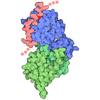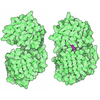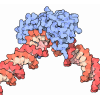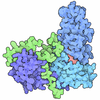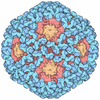[English] 日本語
 Yorodumi
Yorodumi- PDB-6r7n: Structural basis of Cullin-2 RING E3 ligase regulation by the COP... -
+ Open data
Open data
- Basic information
Basic information
| Entry | Database: PDB / ID: 6r7n | ||||||
|---|---|---|---|---|---|---|---|
| Title | Structural basis of Cullin-2 RING E3 ligase regulation by the COP9 signalosome | ||||||
 Components Components |
| ||||||
 Keywords Keywords | LIGASE / Cullin-Ring E3 Ligases (CRLs) COP9 signalosome (CSN) deneddylation VHL tumour suppressor substrate receptor | ||||||
| Function / homology |  Function and homology information Function and homology informationCOP9 signalosome assembly / trophectodermal cell proliferation / GTPase inhibitor activity / deNEDDylase activity / protein deneddylation / regulation of protein neddylation / activation of NF-kappaB-inducing kinase activity / negative regulation of beige fat cell differentiation / cullin-RING-type E3 NEDD8 transferase / NEDD8 transferase activity ...COP9 signalosome assembly / trophectodermal cell proliferation / GTPase inhibitor activity / deNEDDylase activity / protein deneddylation / regulation of protein neddylation / activation of NF-kappaB-inducing kinase activity / negative regulation of beige fat cell differentiation / cullin-RING-type E3 NEDD8 transferase / NEDD8 transferase activity / COP9 signalosome / cullin-RING ubiquitin ligase complex / Cul7-RING ubiquitin ligase complex / cellular response to chemical stress / Loss of Function of FBXW7 in Cancer and NOTCH1 Signaling / target-directed miRNA degradation / elongin complex / protein K27-linked ubiquitination / positive regulation of protein autoubiquitination / RNA polymerase II transcription initiation surveillance / protein neddylation / NEDD8 ligase activity / RHOBTB1 GTPase cycle / VCB complex / negative regulation of response to oxidative stress / regulation of DNA damage response, signal transduction by p53 class mediator / Cul5-RING ubiquitin ligase complex / inner cell mass cell proliferation / ubiquitin-ubiquitin ligase activity / ubiquitin-dependent protein catabolic process via the C-end degron rule pathway / SCF ubiquitin ligase complex / Cul2-RING ubiquitin ligase complex / negative regulation of type I interferon production / SCF-dependent proteasomal ubiquitin-dependent protein catabolic process / Cul3-RING ubiquitin ligase complex / negative regulation of mitophagy / Cul4A-RING E3 ubiquitin ligase complex / Cul4-RING E3 ubiquitin ligase complex / Prolactin receptor signaling / Cul4B-RING E3 ubiquitin ligase complex / ubiquitin ligase complex scaffold activity / Pausing and recovery of Tat-mediated HIV elongation / Tat-mediated HIV elongation arrest and recovery / response to light stimulus / skeletal muscle cell differentiation / cullin family protein binding / HIV elongation arrest and recovery / Pausing and recovery of HIV elongation / protein monoubiquitination / Tat-mediated elongation of the HIV-1 transcript / Formation of HIV-1 elongation complex containing HIV-1 Tat / site of DNA damage / Formation of HIV elongation complex in the absence of HIV Tat / protein K48-linked ubiquitination / RNA Polymerase II Transcription Elongation / Formation of RNA Pol II elongation complex / signal transduction in response to DNA damage / JNK cascade / Nuclear events stimulated by ALK signaling in cancer / transcription-coupled nucleotide-excision repair / RNA Polymerase II Pre-transcription Events / positive regulation of TORC1 signaling / regulation of cellular response to insulin stimulus / negative regulation of insulin receptor signaling pathway / intrinsic apoptotic signaling pathway / post-translational protein modification / T cell activation / negative regulation of canonical NF-kappaB signal transduction / Regulation of BACH1 activity / transcription corepressor binding / Degradation of CRY and PER proteins / TP53 Regulates Transcription of DNA Repair Genes / transcription initiation at RNA polymerase II promoter / transcription elongation by RNA polymerase II / cellular response to amino acid stimulus / Degradation of DVL / G1/S transition of mitotic cell cycle / Degradation of GLI1 by the proteasome / negative regulation of canonical Wnt signaling pathway / GSK3B and BTRC:CUL1-mediated-degradation of NFE2L2 / Negative regulation of NOTCH4 signaling / Ubiquitin-Mediated Degradation of Phosphorylated Cdc25A / Hedgehog 'on' state / Recognition of DNA damage by PCNA-containing replication complex / Vif-mediated degradation of APOBEC3G / FBXL7 down-regulates AURKA during mitotic entry and in early mitosis / Degradation of GLI2 by the proteasome / GLI3 is processed to GLI3R by the proteasome / Inactivation of CSF3 (G-CSF) signaling / RING-type E3 ubiquitin transferase / Degradation of beta-catenin by the destruction complex / Oxygen-dependent proline hydroxylation of Hypoxia-inducible Factor Alpha / DNA Damage Recognition in GG-NER / Evasion by RSV of host interferon responses / NOTCH1 Intracellular Domain Regulates Transcription / Constitutive Signaling by NOTCH1 PEST Domain Mutants / Constitutive Signaling by NOTCH1 HD+PEST Domain Mutants / Dual Incision in GG-NER / Transcription-Coupled Nucleotide Excision Repair (TC-NER) / Formation of TC-NER Pre-Incision Complex Similarity search - Function | ||||||
| Biological species |  Homo sapiens (human) Homo sapiens (human) | ||||||
| Method | ELECTRON MICROSCOPY / single particle reconstruction / cryo EM / Resolution: 6.5 Å | ||||||
 Authors Authors | Faull, S.V. / Lau, A.M.C. / Martens, C. / Ahdash, Z. / Yebenes, H. / Schmidt, C. / Beuron, F. / Cronin, N.B. / Morris, E.P. / Politis, A. | ||||||
| Funding support |  United Kingdom, 1items United Kingdom, 1items
| ||||||
 Citation Citation |  Journal: Nat Commun / Year: 2019 Journal: Nat Commun / Year: 2019Title: Structural basis of Cullin 2 RING E3 ligase regulation by the COP9 signalosome. Authors: Sarah V Faull / Andy M C Lau / Chloe Martens / Zainab Ahdash / Kjetil Hansen / Hugo Yebenes / Carla Schmidt / Fabienne Beuron / Nora B Cronin / Edward P Morris / Argyris Politis /    Abstract: Cullin-Ring E3 Ligases (CRLs) regulate a multitude of cellular pathways through specific substrate receptors. The COP9 signalosome (CSN) deactivates CRLs by removing NEDD8 from activated Cullins. ...Cullin-Ring E3 Ligases (CRLs) regulate a multitude of cellular pathways through specific substrate receptors. The COP9 signalosome (CSN) deactivates CRLs by removing NEDD8 from activated Cullins. Here we present structures of the neddylated and deneddylated CSN-CRL2 complexes by combining single-particle cryo-electron microscopy (cryo-EM) with chemical cross-linking mass spectrometry (XL-MS). These structures suggest a conserved mechanism of CSN activation, consisting of conformational clamping of the CRL2 substrate by CSN2/CSN4, release of the catalytic CSN5/CSN6 heterodimer and finally activation of the CSN5 deneddylation machinery. Using hydrogen-deuterium exchange (HDX)-MS we show that CRL2 activates CSN5/CSN6 in a neddylation-independent manner. The presence of NEDD8 is required to activate the CSN5 active site. Overall, by synergising cryo-EM with MS, we identify sensory regions of the CSN that mediate its stepwise activation and provide a framework for understanding the regulatory mechanism of other Cullin family members. | ||||||
| History |
|
- Structure visualization
Structure visualization
| Movie |
 Movie viewer Movie viewer |
|---|---|
| Structure viewer | Molecule:  Molmil Molmil Jmol/JSmol Jmol/JSmol |
- Downloads & links
Downloads & links
- Download
Download
| PDBx/mmCIF format |  6r7n.cif.gz 6r7n.cif.gz | 889.6 KB | Display |  PDBx/mmCIF format PDBx/mmCIF format |
|---|---|---|---|---|
| PDB format |  pdb6r7n.ent.gz pdb6r7n.ent.gz | 732.9 KB | Display |  PDB format PDB format |
| PDBx/mmJSON format |  6r7n.json.gz 6r7n.json.gz | Tree view |  PDBx/mmJSON format PDBx/mmJSON format | |
| Others |  Other downloads Other downloads |
-Validation report
| Arichive directory |  https://data.pdbj.org/pub/pdb/validation_reports/r7/6r7n https://data.pdbj.org/pub/pdb/validation_reports/r7/6r7n ftp://data.pdbj.org/pub/pdb/validation_reports/r7/6r7n ftp://data.pdbj.org/pub/pdb/validation_reports/r7/6r7n | HTTPS FTP |
|---|
-Related structure data
| Related structure data |  4744MC  4736C  4739C  4741C  4742C  6r6hC  6r7fC  6r7hC  6r7iC M: map data used to model this data C: citing same article ( |
|---|---|
| Similar structure data |
- Links
Links
- Assembly
Assembly
| Deposited unit | 
|
|---|---|
| 1 |
|
- Components
Components
-COP9 signalosome complex subunit ... , 5 types, 5 molecules ADHCB
| #1: Protein | Mass: 55606.496 Da / Num. of mol.: 1 Source method: isolated from a genetically manipulated source Source: (gene. exp.)  Homo sapiens (human) / Gene: GPS1, COPS1, CSN1 / Production host: Homo sapiens (human) / Gene: GPS1, COPS1, CSN1 / Production host:  |
|---|---|
| #2: Protein | Mass: 46322.688 Da / Num. of mol.: 1 Source method: isolated from a genetically manipulated source Source: (gene. exp.)  Homo sapiens (human) / Gene: COPS4, CSN4 / Production host: Homo sapiens (human) / Gene: COPS4, CSN4 / Production host:  |
| #3: Protein | Mass: 22258.342 Da / Num. of mol.: 1 Source method: isolated from a genetically manipulated source Source: (gene. exp.)  Homo sapiens (human) / Gene: COPS8, CSN8 / Production host: Homo sapiens (human) / Gene: COPS8, CSN8 / Production host:  |
| #7: Protein | Mass: 45606.543 Da / Num. of mol.: 1 Source method: isolated from a genetically manipulated source Source: (gene. exp.)  Homo sapiens (human) / Gene: COPS3, CSN3 / Production host: Homo sapiens (human) / Gene: COPS3, CSN3 / Production host:  |
| #10: Protein | Mass: 51664.570 Da / Num. of mol.: 1 Source method: isolated from a genetically manipulated source Source: (gene. exp.)  Homo sapiens (human) / Gene: COPS2, CSN2, TRIP15 / Production host: Homo sapiens (human) / Gene: COPS2, CSN2, TRIP15 / Production host:  |
-Protein , 5 types, 5 molecules PQRGO
| #4: Protein | Mass: 11748.406 Da / Num. of mol.: 1 Source method: isolated from a genetically manipulated source Source: (gene. exp.)  Homo sapiens (human) / Gene: ELOB, TCEB2 / Production host: Homo sapiens (human) / Gene: ELOB, TCEB2 / Production host:  |
|---|---|
| #5: Protein | Mass: 12485.135 Da / Num. of mol.: 1 Source method: isolated from a genetically manipulated source Source: (gene. exp.)  Homo sapiens (human) / Gene: ELOC, TCEB1 / Production host: Homo sapiens (human) / Gene: ELOC, TCEB1 / Production host:  |
| #6: Protein | Mass: 10092.631 Da / Num. of mol.: 1 Source method: isolated from a genetically manipulated source Source: (gene. exp.)  Homo sapiens (human) / Production host: Homo sapiens (human) / Production host:  |
| #8: Protein | Mass: 23944.400 Da / Num. of mol.: 1 Source method: isolated from a genetically manipulated source Source: (gene. exp.)  Homo sapiens (human) / Production host: Homo sapiens (human) / Production host:  |
| #9: Protein | Mass: 87098.930 Da / Num. of mol.: 1 Source method: isolated from a genetically manipulated source Source: (gene. exp.)  Homo sapiens (human) / Gene: CUL2 / Production host: Homo sapiens (human) / Gene: CUL2 / Production host:  |
-Non-polymers , 1 types, 3 molecules 
| #11: Chemical |
|---|
-Experimental details
-Experiment
| Experiment | Method: ELECTRON MICROSCOPY |
|---|---|
| EM experiment | Aggregation state: PARTICLE / 3D reconstruction method: single particle reconstruction |
- Sample preparation
Sample preparation
| Component | Name: CNS (COP9 Signalosome) with CSN5/CSN6 the catalytic heterodimer complexed with CUL2 (CUL2, ElonginB, ElongingC, Rbx1 and VDL) Type: COMPLEX / Entity ID: #1-#10 / Source: RECOMBINANT |
|---|---|
| Molecular weight | Experimental value: NO |
| Source (natural) | Organism:  Homo sapiens (human) Homo sapiens (human) |
| Source (recombinant) | Organism:  |
| Buffer solution | pH: 7.5 Details: 15 mM HEPES pH 7.5 100 mM NaCl 0.5 mM DTT 1% Glycerol |
| Specimen | Embedding applied: NO / Shadowing applied: NO / Staining applied: NO / Vitrification applied: YES |
| Vitrification | Instrument: FEI VITROBOT MARK IV / Cryogen name: ETHANE |
- Electron microscopy imaging
Electron microscopy imaging
| Experimental equipment |  Model: Titan Krios / Image courtesy: FEI Company |
|---|---|
| Microscopy | Model: FEI TITAN KRIOS |
| Electron gun | Electron source:  FIELD EMISSION GUN / Accelerating voltage: 300 kV / Illumination mode: FLOOD BEAM FIELD EMISSION GUN / Accelerating voltage: 300 kV / Illumination mode: FLOOD BEAM |
| Electron lens | Mode: BRIGHT FIELD / Nominal defocus max: 3000 nm / Nominal defocus min: 1800 nm |
| Specimen holder | Specimen holder model: FEI TITAN KRIOS AUTOGRID HOLDER |
| Image recording | Electron dose: 45 e/Å2 / Detector mode: COUNTING / Film or detector model: GATAN K2 SUMMIT (4k x 4k) |
- Processing
Processing
| CTF correction | Type: PHASE FLIPPING AND AMPLITUDE CORRECTION |
|---|---|
| Symmetry | Point symmetry: C1 (asymmetric) |
| 3D reconstruction | Resolution: 6.5 Å / Resolution method: FSC 0.143 CUT-OFF / Num. of particles: 22471 / Symmetry type: POINT |
| Atomic model building | Protocol: FLEXIBLE FIT |
 Movie
Movie Controller
Controller


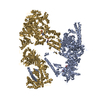
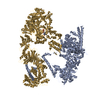
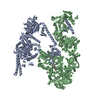
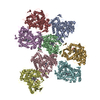
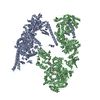
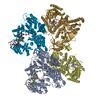
 PDBj
PDBj